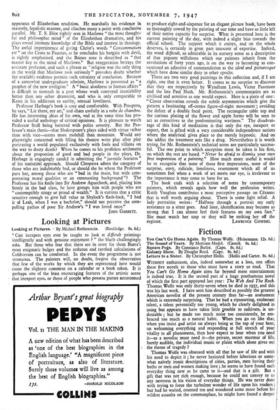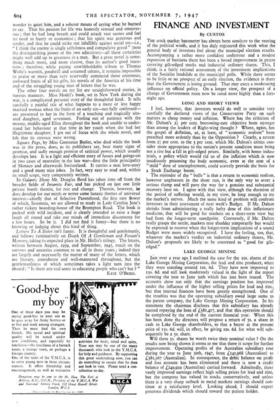Fiction
You Can't Go Home Again. By Thomas Wolfe. (Heinemann. 12s. 6d.)
The Sound of Years. By Merriam Model. (Cassell. 9s. 6d.)
Square Pegs. By Constance Butler. (Cape. 8s. 6d.) Galanty Show. By Douglas Reed. (Cape. 8s. 6d.) Letters to a Sister. By Christopher Hollis. (Hollis and Carter. 8s. 6d.) WITHotrr enthusiasm, alas, indeed somewhat at a loss, one offers these five novels to those who must have a story to read. That You Can't Go Home Again aims far beyond mere entertainment is indeed true. It is the second part of a huge posthumous novel of which the first part appeared last year : The Web And The Rock. Thomas Wolfe was only thirty-seven when he died in 1937, and this was his last work. I have seen him described as possibly the greatest American novelist of the present century thus far—an assessment which is extremely surprising. That he had a ripsnorting, exuberant talent, a talent perennially too young, which he clearly delighted in using but appears to have taken little £rouble to cultivate, is un- deniable ; but he made too much noise too consistently, he em- braced too much as a natural habit. When you go on like that, when you insist qua artist on always being at the top of your bent, on welcoming everything and responding at full stretch of your vitality to all phenomena, then how expect to hear when you need it—as a novelist must need it—the private, secret murmur of life, barely audible, the individual music or plaint which alone gives out the theme of tragedy ?
Thomas Wolfe was obsessed with all that he saw of life and with
his need to depict it; never hesitated before laborious or some- what naively ironic dscriptions of cities, parties, men having their baths or men and women making love ; he seems to have found each everyday thing new as he came to it—and that is a gift. But a gift that was not rich enough, because he could not convey to us any newness in his vision of everyday things. He was never done with trying to force the turbulent wonder of life upon his readers ; but had he waited, counted ten and wondered some more before his wildest assaults on the commonplace, he might have found a deeper
wonder to quiet him, and a soberer means of saying what he burned to say. That his passion for life was honestly sensual and otnniver- ous ; that he had long breath and could attack vast scenes and feel no need to hurry or economise ; that his spirit was generous and tender, and that he could strike out infallibly against social rot—i.e., " I think the enemy fis single selfishness and compulsive greed " (note the distinguishing power of the two adjectives)—all these certainties . might well add up to greatness in a man. But a great novel is some- thing much more, and more elusive, than its author's good inten- tions ; therefore, while paying unwithholdable tribute to Thomas Wolfe's warmth, goodwill and untamed talents, it remains impossible to praise or more than very reservedly commend those enormous, awkward fruits of all his gifts, his novels of the America of his time and of the struggling young man of letters that he was. The other four novels on my list are straightforward stories, in various manners. Miss Model's book, set in New York during the war, is a complicated personal story of the thoughtful kind. It tells carefully a painful tale of what happens to a more or less happy married woman when the fruits of an early sin—not fully confessed— are presented to her in the form of a touching and tragically situ- ated daughter, aged seventeen. Feeling out of patience with the moony, middle-aged Ellen throughout the book and unable to under- stand her behaviour at that time in her youth when she had her illegitimate daughter, I got out of focus with the whole novel, and felt that its stresses were wrong.
Square Pegs, by Miss Constance Butler, who died while the book was in the press, does, as its publishers say, bear many signs of promise, and sadly enough promise of satirical power, which usually develops late. It is a light and efficient story of fusses and goings-on in two cases of neutrality in the late war—first the little principality of Monaco and afterwards Switzerland. It carries a neat love-story and a good many nice jokes. In fact, very easy to read and, within its small scope, very competently written. In Galanty Show Mr. Douglas Reed has taken time off from the broader fields of Insanity Fair, and has picked on just one little private booth therein, for rest and change. Therein, however, be does develop for our mirth or terror some lunatic themes of universal interest—chiefly that of Selective Parenthood, the first rare flower of which, Insemnia, we are allowed to study in Lady Cynthia Jene's rather rickety boarding-house off the Brompton Road. The book is packed with wild incident, and is clearly intended to raise a huge laugh all round and take our minds off immediate discontents for a few hours. So be it. I did not find it funny—but there is no knowing or judging about this kind of thing.
,Letters To A Sister isn't funny. It is thoughtful and gentlemanly, and follows ruminatively on Death Of A Gentleman and Fossett's Memory, taking its expected place in Mr. Hollis's trilogy. The letters, written between August, 1939, and September, 1945, touch on the sorrows and anxieties common to us all in those years ; indeed they are largely and necessarily the matter of many of the letters, which are literary, considerate and well-mannered throughout, but the gentlemanliness of which sometimes takes a light turn into the absurd : " Is there any real sense in educating people who can't bat ? "
KATE O'BRIEN.



































 Previous page
Previous page